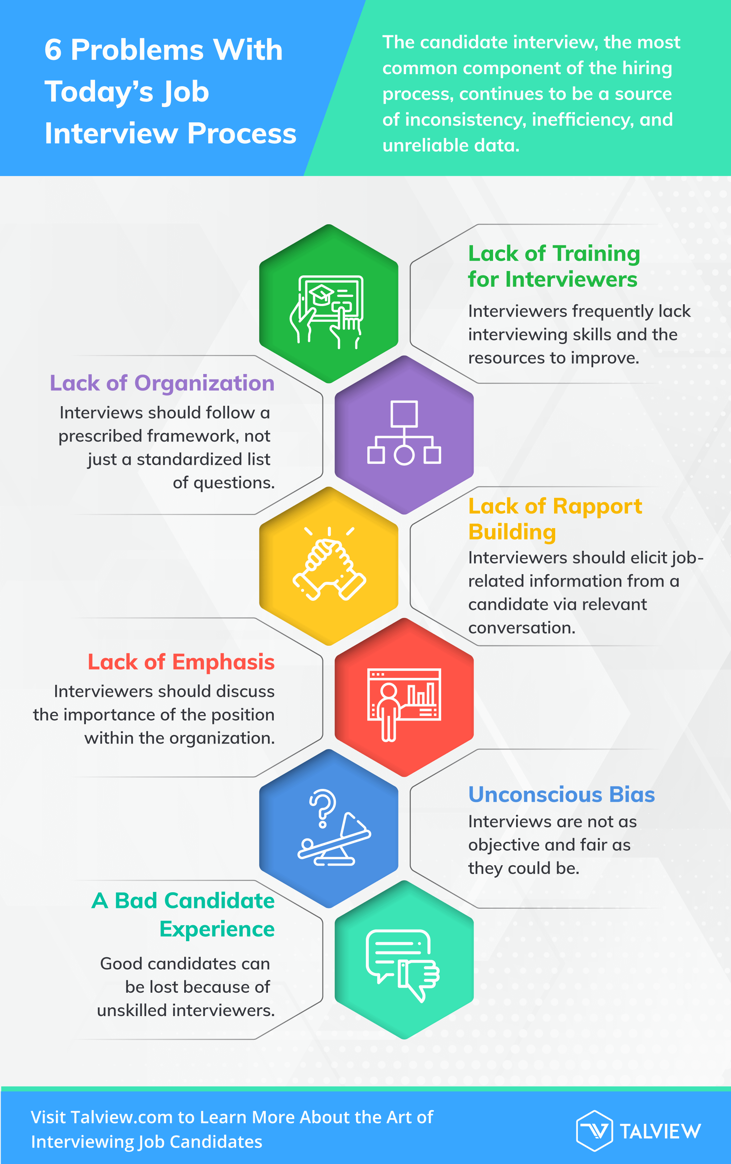A Blind Spot in the Hiring Process
Faced with waves of disruption, from a global pandemic to the great resignation and a growing skills-gap, talent acquisition and human resources professionals struggle to meet hiring goals. At the same time, the candidate interview, the most common component of the hiring process, continues to be a source of inconsistency, inefficiency, and unreliable data.
While most people are well-intentioned, once you leave the ranks of talent acquisition professionals, interviewers typically lack the training to elicit information that is indicative of a candidate’s likelihood of success on the job. They often fail to probe the most important topics. They aren’t trained in a consistent methodology of how to rate a candidate in a reliable and accurate manner.
Another significant challenge is simply human nature. Unconscious bias related to a candidate’s work history, appearance, or demographic often creeps into competency ratings, further decreasing the effectiveness of the interview.
“Humans are subject to more than 180 recognized cognitive biases.”
This lack of skill and training on the part of interviewers increases the likelihood of losing good candidates in today’s fast-paced market as well as the likelihood of poor employee retention when competent candidates are hired.
6 Problems with Today’s Job Interview Process
Most organizations focus on measuring candidates' performance in the interviews to select the best talent. But who is measuring interviewers and ensuring they are conducting high-quality interviews? What if they are not asking relevant questions? What if they aren't rating a candidate accurately? What if they have biases toward a candidate?
In fact, humans are subject to more than 180 recognized cognitive biases in traditional hiring practices. So how do we know if interviewers are providing fair and reliable assessments of candidates they interview? Without training, a structured interview framework, and consistent feedback on their interview skills, how is it possible to overcome these obstacles?

Here are six of the major challenges we’ve identified with today’s interview process for job candidates.
- Lack of Training for Interviewers
Interviewers frequently lack interviewing skills and the resources to improve. - Lack of Organization
Interviews should follow a prescribed framework, not just a standardized list of questions. - Lack of Rapport Building
Interviewers should elicit job-related information from a candidate via relevant conversation. - Lack of Emphasis
Interviewers should discuss the importance of the position within the organization. - Unconscious Bias
Interviews are not as objective and fair as they could be. - A Bad Candidate Experience
Good candidates can be lost because of unskilled interviewers.
Goals for a Better Interviewing Process
Overcoming these challenges in the interview process can only improve the efficiency and effectiveness of the hiring process. It should be a priority in today’s tough talent market. Creating interview frameworks that are fair, replicable, and highly accurate in their assessment of candidates. Implementing systems to reduce unconscious bias. Deploying a methodology that not only helps train, but provides a consistent feedback analysis of an interviewer’s skill.
“LISTEN!”
Ensuring your organization has fair candidate interviewing practices will significantly increase the odds of recruiting top talent.
Simple Steps to Improve Your Interview Process
The interview is the most common assessment for the job candidates your talent acquisition team has recruited. If a candidate has reached the interview step in the hiring process, don’t waste the opportunity.
Provide interviewers with whatever training is possible. Give them an interview framework to follow. Ensure they’ve reviewed a candidate's resume or CV. Give your interviewers some standard questions to get a conversation started with the candidate.
“Make the interview a conversation, not an interrogation.”
Recognize that most candidates are nervous. Do what you can to put the candidate at ease. Interviewers will gain better insights into a candidate when the candidate is comfortable.
Listen. Pay attention to the candidate. Follow up their responses with questions centred around their comments. Make it a conversation, not an interrogation, and politely keep the conversation on topic and relevant to the job opportunity.
Training interviewers is only the first step to overhauling and improving the effectiveness of the interview process. But it is a significant first step.
Struggling with the Screening and Interviewing Process
The HCL talent acquisition and HR teams were handling hundreds of applications every week. They were struggling to identify quality candidates among the sheer number of applicants. Simply coordinating candidates, schedules, and initial screenings had become overwhelming.
Read how Talview’s Hiring Solution helped the team at HCL America in our case study.








Leave a Reply